ISLAMABAD: Pakistan President Arif Alvi told the election commission Wednesday to fix a date for a new national ballot, as the supreme court sat to decide the legality of political manoeuvres that led to parliament being dissolved.
The court must rule if the deputy speaker of the national assembly violated the constitution by refusing to allow a no-confidence vote against Prime Minister Imran Khan at the weekend.
Had the vote taken place Khan was certain to have been booted from office, but the move allowed him to get the loyalist president to dissolve parliament and order an election.
The opposition have cried foul and are refusing to cooperate with forming an interim government to oversee any ballot, but on Wednesday Alvi upped the ante.
A statement from his office said the election commission had been told to propose a date "in order to carry out the mandate of the Constitution".
While the opposition applies its resources to the court, Khan effectively hit the campaign trail -- telling party workers in Lahore late Tuesday that he would be more careful in picking candidates to stand for his Tehreek-e-Insaf (PTI) party.
Khan's woes started weeks ago when a group of rebel PTI lawmakers threatened to vote against him, but his fragile ruling coalition was beginning to unravel anyway.
There had been high hopes for Khan when he was elected in 2018 on a promise of sweeping away decades of entrenched corruption and cronyism, but he struggled to maintain support with soaring inflation, a feeble rupee and crippling debt.
Nuclear-armed Pakistan has been wracked by political crises for much of its 75-year existence, and no prime minister has ever seen out a full term.
Whether the election commission has the capacity to organise a ballot within 90 days remains to be seen, with a watchdog group warning this week of "grave concerns" for potential violence.
"The Free and Fair Election Network (FAFEN) has identified multiple constitutional, legal and operational challenges to the conduct of an early election," said the group.
"Public confusion and political divisions that have already arisen as a result can potentially translate into violent expression."
Khan has already blown anti-US sentiment into the political atmosphere by saying the opposition had colluded with Washington for "regime change".
The cricket star turned politician says Western powers want him removed because he will not stand with them against Russia and China, and the issue is sure to ignite any forthcoming election.
It is unclear when or how the court will rule on the issue -- or if Khan would even accept its decision -- but there is precedent.
In 1988, Muhammad Khan Junejo appealed to the court after the assembly was dissolved by then president General Zia-ul-Haq, who had taken power in a military coup years earlier.
It agreed his government had been dissolved unconstitutionally, but ruled that since elections had been announced, it was best to move on.
In 1993, the court ruled president Ghulam Ishaq Khan had also illegally dissolved the assembly -- then with Nawaz Sharif as prime minister.
The supreme court is ostensibly independent, but rights activists say previous benches have been used by civilian and military administrations to do their bidding throughout Pakistan's history.
Publicly the military appears to be keeping out of the current fray, but there have been four coups since independence in 1947 and the country has spent more than three decades under army rule.
"I don't think the court is going to deliver any noticeable decision, it will be a sort of doctrine of necessities," said Ayesha Siddiqa, an independent analyst. "On one side judges will declare the ruling of the deputy speaker as unconstitutional, but at the same time will justify the fresh elections... as every political party wants to go for a fresh election."
Pakistan president asks election commission for date for early polls as political crisis continues
https://arab.news/5b3ed
Pakistan president asks election commission for date for early polls as political crisis continues
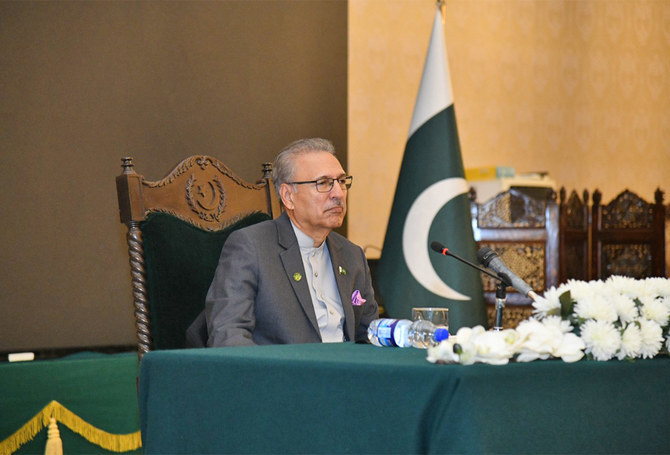
- Dr Arif Alvi tells election commission to propose a date "in order to carry out the mandate of the Constitution"
- Free and Fair Election Network identifies constitutional, legal and operational challenges for early elections
Pakistan hopes to get new IMF loan by early July, says finance minister
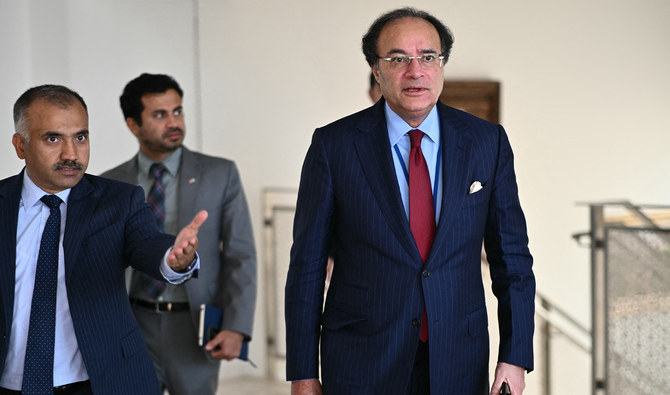
- Pakistan’s current $3 billion financial arrangement with IMF expires in late April
- Islamabad is seeking “bigger,” long-term loan to ensure macroeconomic stability
Pakistan is hoping to reach a staff-level agreement with the International Monetary Fund by June or early July, its finance minister said on Tuesday.
The country’s current $3 billion arrangement with the fund runs out in late-April, which it secured last summer to avert a sovereign default.
Islamabad is seeking a long-term bigger loan to help bring permanence to macroeconomic stability as well as an umbrella under which the country can execute structural reforms.
“We are still hoping that we get a staff-level agreement by June or early July,” Finance Minister Muhammad Aurangzeb told a conference in Islamabad.
He returned from Washington last week after leading a team to attend the IMF and World Bank’s spring meetings. “We had very good discussions in Washington,” he said.
He said he did not know at this stage the volume and tenure of the longer program.
Pakistan ‘rarely’ punished officials for rights abuses in 2023— State Department report
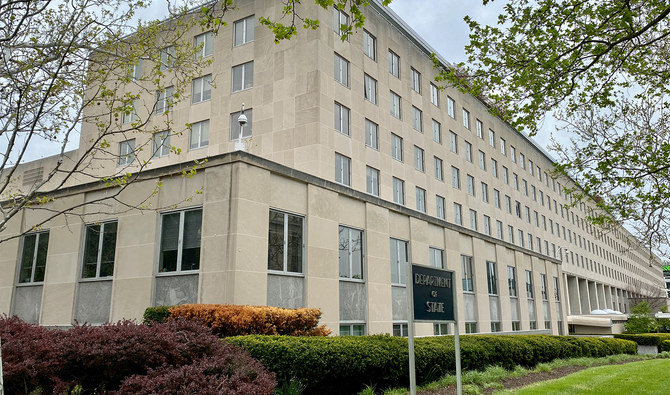
- US State Department releases annual “Country Reports on Human Rights Practices” for the year 2023
- Report says Pakistan witnessed extrajudicial killings, torture and restrictions on media freedoms last year
ISLAMABAD: Pakistan’s government “rarely” took steps to identify and punish officials who may have been involved in rights abuses in 2023, a report released by the US State Department said on Tuesday, pointing out incidents of extrajudicial killings, torture, enforced disappearances, violence against journalists and restrictions on media freedom had taken place in the country last year.
US Department of State released its annual “Country Reports on Human Rights Practices” to highlight rights issues in several countries, including Pakistan. In the report, Washington identified that Pakistan last year witnessed arbitrary killings, extrajudicial killings, enforced disappearance, torture and “cases of cruel, inhuman, or degrading treatment or punishment by the government or its agents.”
“The government rarely took credible steps to identify and punish officials who may have committed human rights abuses,” the report said.
Cases of “enforced disappearances” of citizens have long plagued Pakistan, where militants have waged a war against the state for decades. Families say people picked up by security forces often disappear for years, and are sometimes found dead, with no official explanation. Pakistani security agencies deny involvement in such disappearances.
The report also pointed out that last year Pakistan had seen incidents of restrictions on freedom of expression and media freedom, violence against journalists, unjustified arrests, disappearances of journalists, censorship and criminal defamation laws.
Pakistan’s recent actions to restrict Internet and mobile services throughout the country, especially on days when elections are held, have invited criticism from rights organizations and Washington. The interior ministry last week confirmed it had banned social media platform X in February to protect national security, maintain public order, and preserve the country’s “integrity.”
The State Department report further pointed out that rights issues in Pakistan during 2023 included extensive gender-based violence, including domestic or intimate partner violence, sexual violence, early, child and forced marriages. It said Pakistan had also reported incidents of female genital mutilation and crimes involving violence or threats of violence targeting members of religious, racial and ethnic minorities.
The report added that violence, abuse and social and religious intolerance by militant organizations and other non-state actors, both local and foreign, contributed to a culture of lawlessness in the country.
“Terrorist and cross-border militant attacks against civilians, soldiers, and police caused hundreds of casualties,” the report noted, crediting Pakistan’s military, police and other law enforcement agencies for carrying out “significant campaigns” against militants last year.
The South Asian country has seen an uptick in violence, mainly suicide attacks, since November 2022 when a fragile truce between militants and the state broke down. Pakistan has since then carried out military operations against the Pakistani Taliban or the Tehreek-e-Taliban Pakistan (TTP) and a Baloch separatist militant organization, the Balochistan Liberation Army (BLA) in the country’s two western provinces that border Afghanistan.
Iranian president in Lahore on second day of official visit to Pakistan
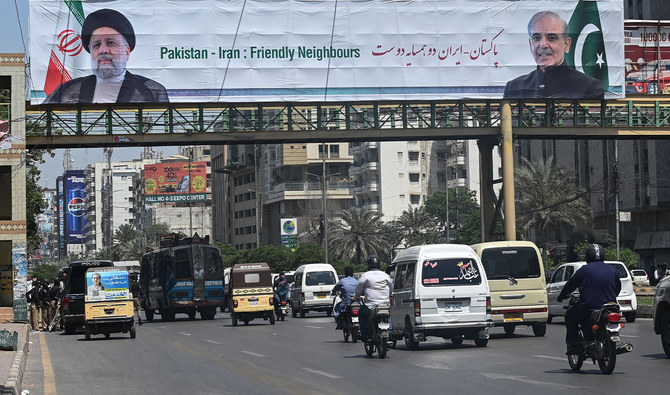
- On Monday, Islamabad and Tehran signed eight accords including on trade, technology, health, culture, information
- Interior ministers of Pakistan and Iran agree on joint action plan to deal with terrorism, smuggling, drug trafficking
ISLAMABAD: Iranian President Ebrahim Raisi arrived in Lahore on Tuesday on the second day of a three-day visit to Pakistan where he will meet top government officials and business leaders before traveling to the country’s commercial hub, Karachi.
Raisi arrived in Islamabad on Monday on a three-day visit as the two Muslim neighbors seek to mend ties after unprecedented tit-for-tat military strikes earlier this year. The Iranian official’s visit is the first by any head of state to Pakistan after the South Asian nation’s February general elections and the formation of a new government headed by Prime Minister Shehbaz Sharif. The visit also comes as tensions are high in the Middle East after Iran launched airstrikes on Israel a week ago and Israel retaliated with its own attack on Friday.
“Iranian President Syed Ibrahim Raisi has reached Lahore,” state television PTV reported, where he was received by Punjab Chief Minister Maryam Nawaz.
The Iranian president began his Lahore trip by visiting the mausoleum of Allama Muhammad Iqbal, Pakistan’s national poet, whose literary works in the Persian language have garnered him wide recognition in Iran.
After meetings in Lahore, Raisi will travel to Karachi, where he will hold meetings with the provincial leadership and be awarded an honorary doctorate by the University of Karachi, state-run Radio Pakistan reported.
On Monday, Raisi held delegation-level meetings in the Pakistani capital as well as one-on-one discussions with the prime minister, president, army chief, chairman senate and speaker national assembly.
He also witnessed the signing of eight MoUs and agreements covering different fields including trade, science technology, agriculture, health, culture, and judicial matters. These include an MoU on the establishment of the Rimdan-Gabd Joint Free/Special Zone; on cooperation between the Ministry of Cooperative Labour and Social Welfare of Iran and the Ministry of Overseas Pakistani and Human Resources Development of Pakistan; on judicial assistance and legal cooperation at the ministry levels; on cooperation for animal hygiene and health; on mutual recognition in the field of quarantine and phytosanitary; and on the promotion of culture and films.
“The economic and trade volume between Iran and Pakistan is not acceptable at all and we have decided at the first step to increase the trade volume between our two countries to $10 billion,” Raisi said at a joint press conference with Sharif.
The interior ministers of Pakistan and Iran also met on Monday and discussed border management to prevent smuggling and drugs trafficking, and “decided in principle to ban terrorist organizations in their respective countries,” state news wire APP said.
“The two sides agreed on a joint plan of action to deal with the menace of terrorism being a common problem, with further improving mutual support and exchange of intelligence information.”
A security agreement regarding this decision would be signed “at the earliest,” APP added.
Pakistan and Iran have had a history of rocky relations despite a number of commercial pacts, with Islamabad being historically closer to Saudi Arabia and the United States.
Their highest profile agreement is a stalled gas supply deal signed in 2010 to build a pipeline from Iran’s South Fars gas field to Pakistan’s southern provinces of Balochistan and Sindh.
Pakistan and Iran are also often at odds over instability on their shared porous border, with both countries routinely trading blame for not rooting out militancy.
Tensions surged in January when Pakistan and Iran exchanged airstrikes, both claiming to target alleged militant hideouts in each other’s countries. Both sides have since then undertaken peace overtures and restored bilateral ties.
Pakistani, UAE officials perform groundbreaking of bulk and general cargo terminal in Karachi
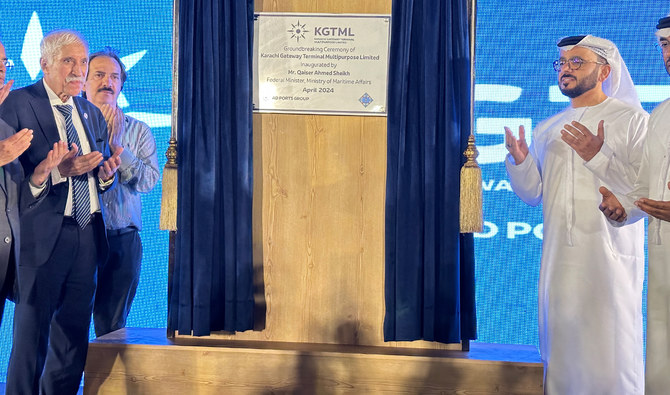
- Pakistan’s maritime affairs minister says UAE’s investment an important “breakthrough” that has increased interest of other players
- Multi-purpose terminal will handle grains, fertilizers and other kinds of export and import, says official of company operating terminal
KARACHI: Pakistani and United Arab Emirates (UAE) officials performed the groundbreaking of a $175 million Bulk and General Cargo terminal on Monday, describing it as an “important breakthrough” for the South Asian country in the maritime sector.
Under a government-to-government (G2G) agreement between Pakistan and the UAE earlier this year, a new 25-year concession agreement was signed between AD Ports Group and Karachi Port Trust (KPT) in Feb. 2024 to outsource operations of the bulk and general cargo terminal.
Under the terms of the agreement, Karachi Gateway Terminal Multipurpose Limited (KGTML), a joint venture between AD Ports Group, as a majority shareholder, and Kaheel Terminals, a UAE-based company, will develop, operate and manage the Bulk and General Cargo Terminal, berths 11 to 17 at Karachi Port’s East Wharf. The move is expected to enhance Karachi’s position as a key player in the maritime industry.
Qaiser Ahmed Sheikh, Pakistan’s minister of maritime affairs, unveiled the KGTML plaque at Karachi Port on Monday, describing the UAE’s investment as a “very important breakthrough” which has increased the interest of other players in the maritime sector.
“This investment from Abu Dhabi Ports is very important for Pakistan, it is a breakthrough,” Sheikh told Arab News at the sidelines of the event. “It is the first investment in terminal and following this, there are many other companies who are also interested in Pakistan.”
The minister shared that Maersk Line, the largest owner and operator of US flag vessels, has also expressed interest in investing in Pakistan.
“We are looking forward to investment from other companies like, you see, other shipping lines,” Sheikh said. “We are having a meeting (on Apr. 25) with Maersk Line and we are also expecting (investment).”
Khurram Aziz Khan, KGTL’s chief executive officer, said AD Ports plans to invest about $157 million for the bulk terminal’s development, adding that it would handle all kinds of bulk cargo.
“This is basically a multi-purpose terminal which will not only handle grains but also fertilizers and other kinds of export and import, dirty or clean cargo as well,” Khan told Arab News.
“We are making a long-term investment to make it a regional hub not only for containers but also for the multi-purpose facilities,” Khan explained, adding that the project, once completed, will also save the time and cost of doing business.
He informed that AD Ports has an overall plan of investing about $395 million in the development of the container and cargo terminal.
“We have an overall plan of $220 million investment in the container terminal and $175 million of investment in the multi-purpose bulk terminal,” the KGTL chief said.
AD Ports Group also presented Sheikh a cheque for the upfront fee payment amounting to $50 payable to KPT as per the terms outlined in the Agreement for Outsourcing of Operations of Bulk and General Cargo Terminal.
Abdul Aziz Baloshi, chief executive officer of Fujairah Terminals, AD Ports Group, said the group was expanding its operations in Pakistan.
“Progress will be made through investment in the supply chain,” Baloshi said at the event. “Karachi port is the future of Pakistan and Pakistan is included in our priority list in the region.”
UAE’s Consul General Bakheet Atiq Al-Remeithi said Emirati investors are interested in investing on a large scale in Pakistan. He said their areas of interest included ports and shipping, railways, and other infrastructure.
“Apart from port investments, investments will be made in railway infrastructure, export zones, and other sectors,” Al-Remeithi shared.
The port operator hoped that the facilities will help Pakistan become the regional hub for handling export and import of cargoes from Central Asian countries.
The agreement for the construction of the Bulk and General Cargo terminal at the Karachi port was based on the concession agreement secured by AD Ports Group to develop, operate and manage container terminal at berths 6-10 at Karachi port’s East Wharf in June 2023.
AD Ports Group had signed a 50-year concession agreement with KPT to secure the terminal’s operations.
Met Office forecasts fresh rains in Pakistan, warns of flash floods and landslides
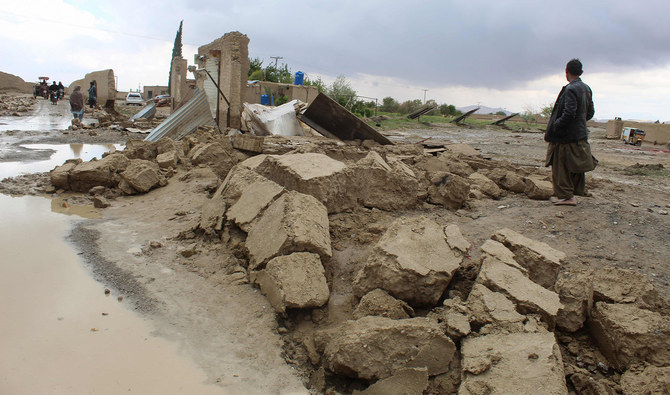
- Windstorms and lightning may affect human lives, crops, loose structures, vehicles and solar panels
- Met Office asks tourists to avoid unnecessary travel, farmers to manage crops accordingly on Apr. 24-29
ISLAMABAD: The Pakistan Meteorological Department (PMD) on Monday said a fresh spell of rains was likely to hit parts of Pakistan this week, warning of flash floods and landslides in the country’s western regions.
A westerly wave is likely to enter western parts of the country on April 24 and grip most upper parts on April 26, according to a statement issued by the PMD.
As a result, rains, wind- or thunderstorms are expected in Balochistan, Khyber Pakhtunkhwa, Punjab, Sindh as well as Gilgit-Baltistan and Azad Kashmir between April 24 and April 29.
“Isolated/moderate to heavy rainfall may generate flash flood in local nullahs/Streams of Balochistan specially (Noushki, Pishin, Harnai, Zhob, Barkhan, Gwadar, Kech and Awaran) on 26th & 27th April, while Dir, Swat, Chitral, Manshera, Kohistan and Kashmir on 27th and 28th April,” the statement read.
“Possibility of landslides in Upper Khyber Pakhtunkhwa, Murree, Galiyat, Kashmir and Gilgit Baltistan may affect the vulnerable locations from 27th to 29th April.”
During this period, the Met Office said, windstorm and lightning could affect human lives, crops, loose structures like electric poles, vehicles and solar panels.
“Farmers especially in wheat harvested areas are advised to manage their crops keeping in view the weather conditions,” it added.
“Tourists are advised to avoid unnecessary traveling particularly from 26h to 29th April.”
Pakistan has witnessed days of extreme weather, killing at least 78 people and destroying property and farmland. Experts say the country is experiencing heavier rains than normal in April because of climate change.
In 2022, downpours swelled rivers and at one point flooded a third of Pakistan, killing 1,739 people. The floods also caused $30 billion in damages, from which Pakistan is still trying to rebuild.










